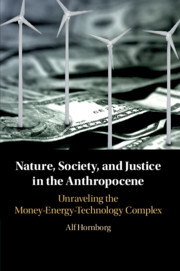Book contents
- Nature, Society, and Justice in the Anthropocene
- New Directions in Sustainability and Society
- Nature, Society, and Justice in the Anthropocene
- Copyright page
- Reviews
- Dedication
- Contents
- Figures
- Acknowledgments
- Introduction
- 1 Rethinking Economy and Technology
- 2 The Anthropocene Challenge to Our Worldview
- 3 Producing and Obscuring Global Injustices
- 4 The Money Game
- 5 Anticipating Degrowth
- 6 The Ontology of Technology
- 7 Energy Technologies as Time–Space Appropriation
- 8 Capitalism, Energy, and the Logic of Money
- 9 Unequal Exchange and Economic Value
- 10 Subjects versus Objects
- 11 Anthropocene Confusions
- 12 Animism, Relationism, and the Ontological Turn
- 13 Conclusions and Possibilities
- Afterword
- References
- Names Index
- Subject Index
Introduction
Published online by Cambridge University Press: 24 June 2019
- Nature, Society, and Justice in the Anthropocene
- New Directions in Sustainability and Society
- Nature, Society, and Justice in the Anthropocene
- Copyright page
- Reviews
- Dedication
- Contents
- Figures
- Acknowledgments
- Introduction
- 1 Rethinking Economy and Technology
- 2 The Anthropocene Challenge to Our Worldview
- 3 Producing and Obscuring Global Injustices
- 4 The Money Game
- 5 Anticipating Degrowth
- 6 The Ontology of Technology
- 7 Energy Technologies as Time–Space Appropriation
- 8 Capitalism, Energy, and the Logic of Money
- 9 Unequal Exchange and Economic Value
- 10 Subjects versus Objects
- 11 Anthropocene Confusions
- 12 Animism, Relationism, and the Ontological Turn
- 13 Conclusions and Possibilities
- Afterword
- References
- Names Index
- Subject Index
Summary
This book is ultimately an argument for degrowth. However, it differs from other critiques of economic growth and capitalism in not approaching the imperative of growth as an idea or policy that we might argue about, as if better ideas and policies could be implemented on the basis of empirical evidence, reason, morality, democratic decision making, or political activism. All these avenues have been tried in innumerable debates and political experiments throughout the world – but all have finally proven futile. Everywhere politics have succumbed to the logic of the market. Democratic political systems have been unable to curb the logic of globalized capitalism. Democracy sees to it that any politician sincere enough to seriously advocate degrowth will not have a future in politics. The ecologically suicidal trajectory of global society is not the result of misguided policies, corrupt politics, or human nature, but of the imperatives inscribed in the artifact of general purpose money – the idea that everything can be converted into anything else.1 Without redesigning money, all our insights and aspirations for a better world will come to nothing. This is tantamount to proposing that we need to transform our very conception of politics by recognizing the power of artifacts to organize social life and, concomitantly, that to change society we need to redesign our artifacts.
- Type
- Chapter
- Information
- Nature, Society, and Justice in the AnthropoceneUnraveling the Money-Energy-Technology Complex, pp. 1 - 18Publisher: Cambridge University PressPrint publication year: 2019

